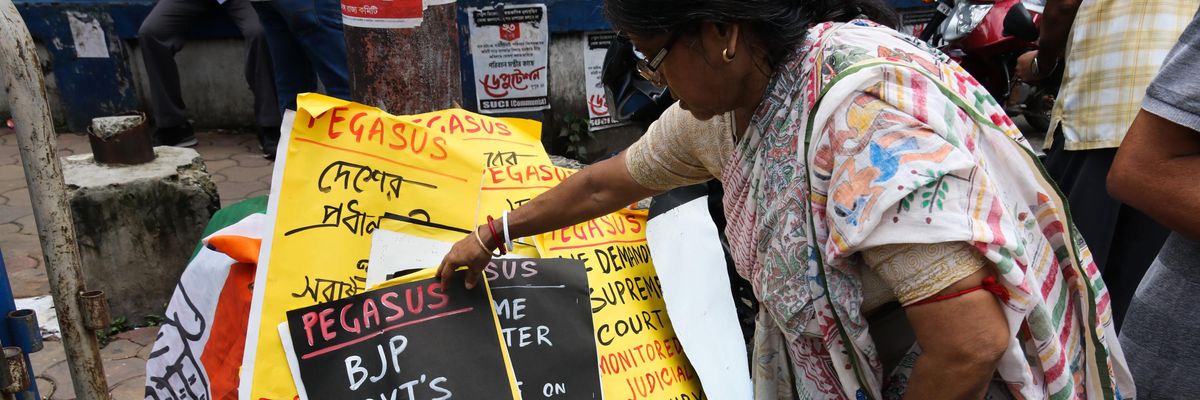We know that the issues around digital surveillance are complicated. The tech side of the tools used and the means to circumvent them are complicated. Drawing a hard line between what may be acceptable to help ensure our personal security and what pushes our societies into Orwellian territory is also complicated.
In spite of being illegal under international human rights law, actors involved in illegal surveillance are almost never held accountable.
As the revelations of the
Pegasus Project show us, illegal surveillance is the latest weapon in the ever-growing arsenal used against journalists and human rights defenders. In effect, surveillance in this context is equivalent to stalking. A pernicious activity that can
easily cross from online harassment to physical attacks. It's illegal. It disproportionately affects those who are among the most vulnerable, whether because of their
gender,
sexual orientation,
race, or
ethnicity. And if people are permitted to stalk with impunity, the problem will not stop.
Increasingly used as a laser-focused tactic, a weapon to intimidate, instil fear, and paralyse the work of journalists, this kind of surveillance puts sources at risk and impedes journalists from providing us with information to expose crime and corruption, and to speak the truth about power.
"I don't think it's journalists as individuals that the government has a problem with. The government has a problem with the people [...] It wants to continue committing crimes in the shadows so that no one will uncover those facts or ask questions about it. And journalists are the ones who spoil this plan."--Azerbaijani journalist Sevinj Vaqifqizi
On this International Day to End Impunity for Crimes Against Journalists, a day
advocated for by IFEX, we need to bring surveillance to the fore as a tactic that is threatening journalists' safety, and draw attention to how impunity creates the conditions under which it will continue to thrive.
IFEX members have long warned of the
dangers of malware like Pegasus. A product of the Israeli NSO Group, it infects targets' phones, exposes data, and even gains access to cameras and microphones. Despite the company's claim that it vets clients based on their human rights records, it sold Pegasus to authoritarian regimes--as well as to countries like
Mexico, where targets included media figures, a government scientist, and international human rights investigators--united by having publicly posed challenging questions to the government.
The personal impact of such surveillance can be devastating.
"When you are speaking, watching, or doing something with someone in your house or in a cafe or wherever you may be, they are there listening to you, watching everything that you do. Everything that you do in your bedroom, the shower, in your kitchen, in your office with your friends, or whoever."--Mexican journalist
Carmen Aristegui: profiled
here"My family members are also victimized. The sources are victimized, people I've been working with, people who told me their private secrets are victimized."--Azerbaijani journalist
Khadija Ismayilova: profiled
hereThe decades our network has put into promoting journalists' safety confirm that it cannot be fully achieved in a climate where individuals--or states--can intimidate, threaten, and harm them, and not be held accountable. Year-round, IFEX members work to bring perpetrators to justice, and to establish conditions that will make it harder for them to commit such crimes in the first place.
We know that it is a massive undertaking. In spite of being illegal under international human rights law, actors involved in illegal surveillance are almost never held accountable.
The challenge is to identify where to intervene, where to spend our energy, where we can have the biggest impact in stemming this predatory practice--including, but not limited to, confronting corporations and governments that enable and participate in the illegal surveillance of journalists.
Ending impunity for illegal surveillance has to be part of this work. It's a long game, not for the weak-of-heart, and this is even more true when the perpetrators of the crimes are states. But we know from our experience seeking accountability for physical attacks on journalists that this type of sustained work does pay off. Just over a week ago, two decades of advocacy--by IFEX member FLIP, by Jineth Bedoya Lima herself, and by so many others--led to the groundbreaking Inter-American Court of Human Rights
ruling in her case that there was "serious, precise and consistent evidence of State involvement in the acts of physical, sexual and psychological torture against the journalist." This ruling sets an important precedent for the entire region.
The other good news is that we have a lot to draw on, on our side. There is a massive, global network of people--working in different fields, perhaps, or focussing on different issues--but with the combined skills, expertise, and clout needed to ensure that illegal surveillance does not go unchallenged, that those found culpable pay a price, and that this price effectively deters others. As long as we keep leveraging opportunities like IDEI to come together, collaborate, learn from and support each other, raise our voices and find strategic pressure points where we can have a real impact, we can, and will, counter the scourge of illegal surveillance of journalists.
